Press
The latest articles written by the press about the work of director Hamad Youssef Al-Nouri
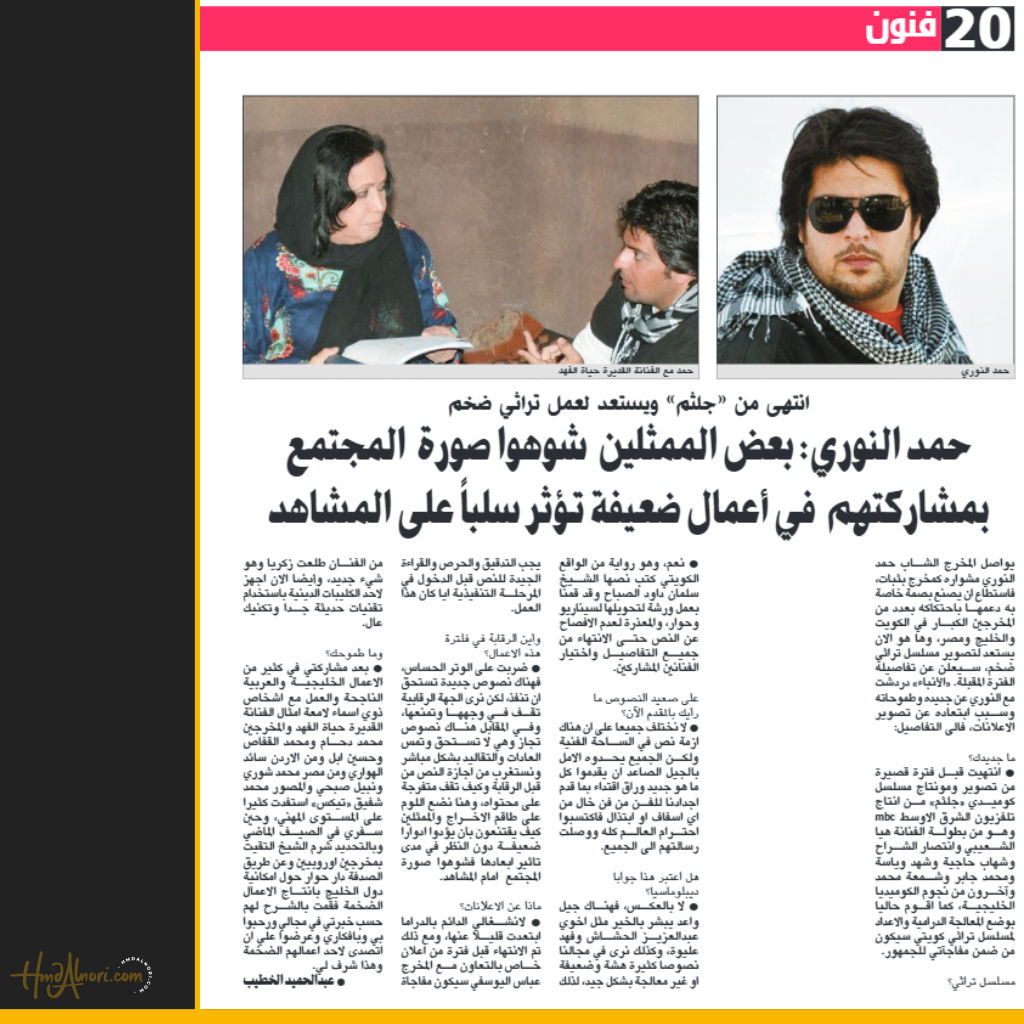
Al-Nouri: Some actors distorted the image of society by participating in weak works that negatively affect the viewer
The young director Hamad Al-Nouri continued his career as a director steadily. “Al-Anbaa” chatted with Al-Nouri about his newness and ambitions and the reason for his avoiding filming advertisements. He said: A short while ago, I finished filming and editing a comedy series “Jaltham” produced by MBC Middle East TV, starring Haya Al-Shuaibi, Intisar Al-Sharrah, Shehab Hajieh, Shahd, Yasa, Muhammad Jaber and Shamaa. Muhammad and others are among the stars of the Gulf comedy, and I am currently developing the drama and preparing for a Kuwaiti heritage series that will be among my surprises to the audience.
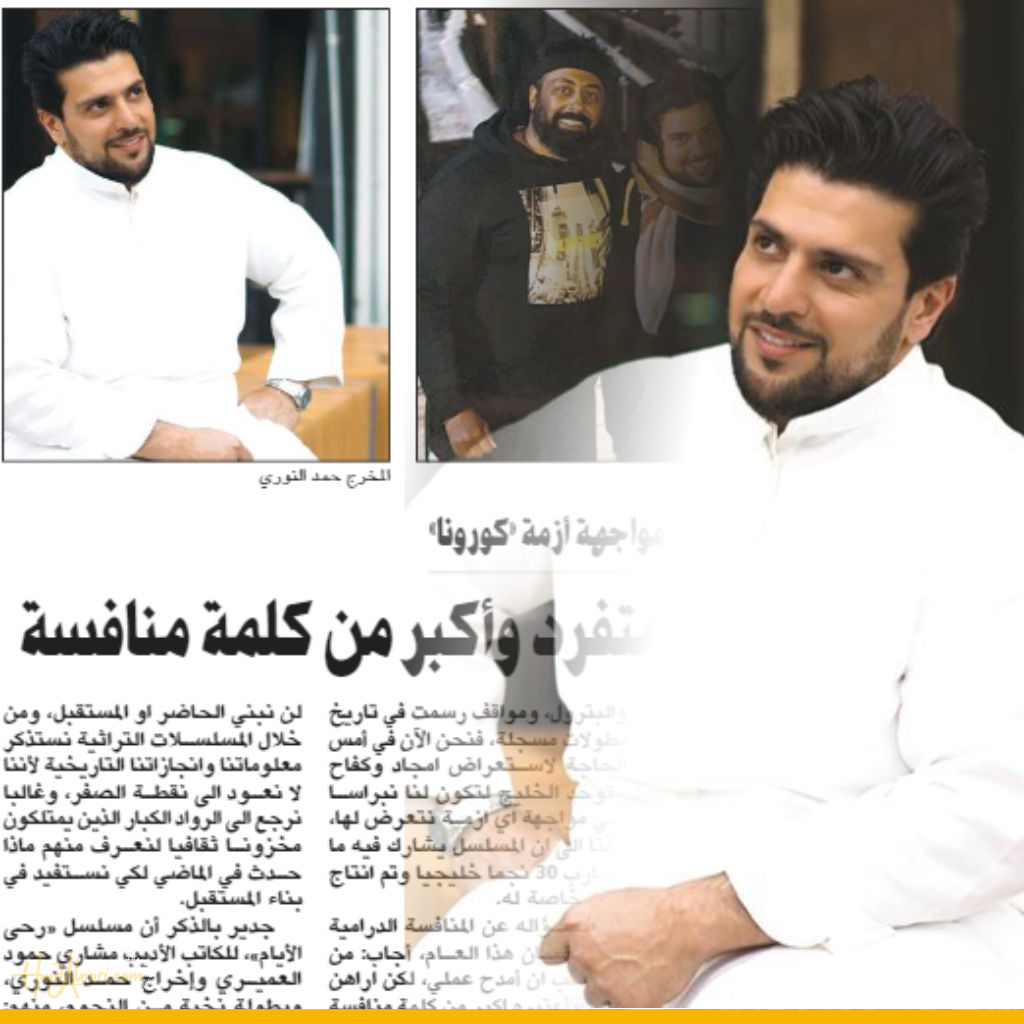
Al-Nouri: I always look at heritage as a replay of history, because without previous experiences, we will not build the present or the future
On the dramatic competition in Ramadan this year, he replied: It is difficult to praise my work, but I bet on it and consider it greater than the word competition with other works, because it has no similar and unique in terms of its handling of four time periods, and because its stories are realistic and unusual, Through «alanba», I would like to thank the writer and producer of the work, Mashari Hammoud Al-Amiri, for this beautiful text, and the great support for presenting this huge series in these difficult circumstances, and I also thank the director of the production department, Ahmed Abdullah, for his efforts.
Director Hamad Al-Nouri touched on the secret of his association with heritage works, and said: I always look at heritage as a replay of history, because without previous experiences we will not build the present or the future, and through heritage series we remember our information and historical achievements because we do not go back to the zero point, and often we go back to The great pioneers who possess a cultural stockpile to know from them what happened in the past in order to benefit in building the future.
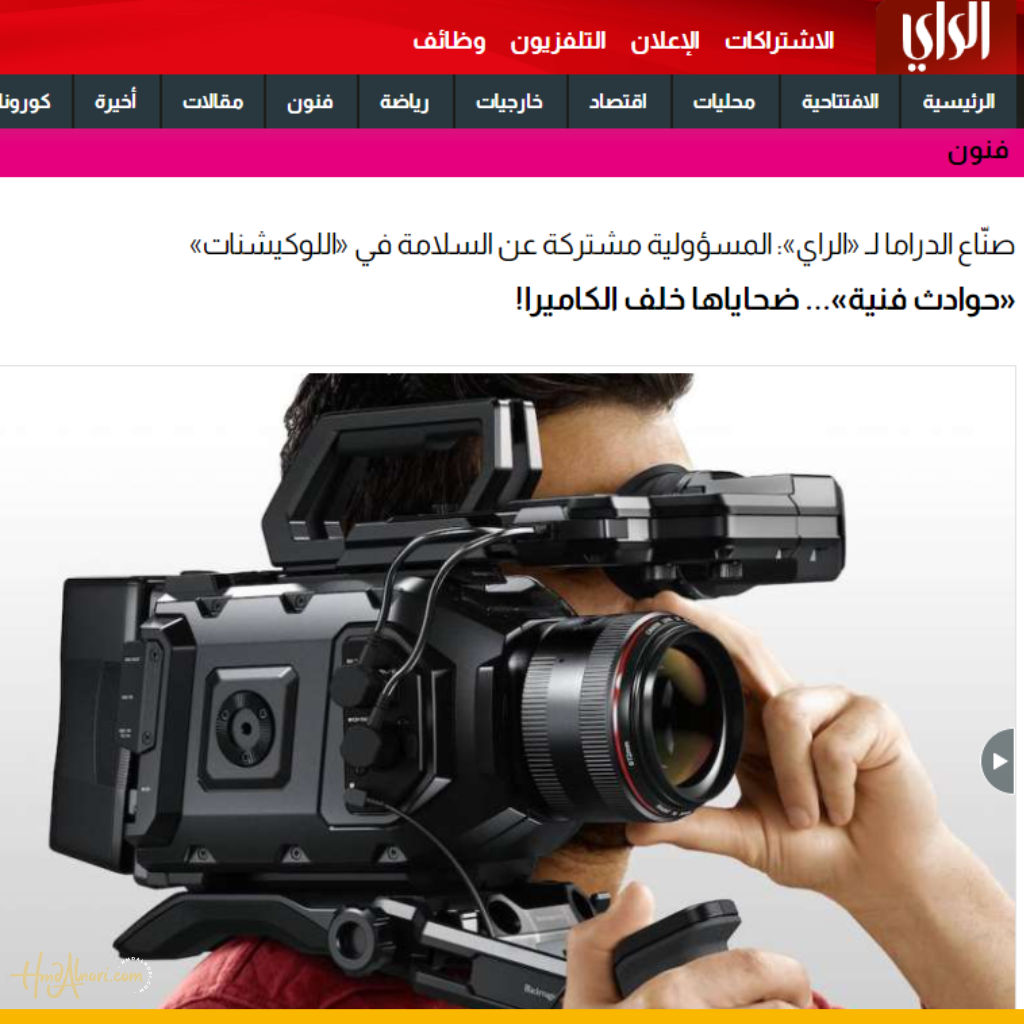
Many technicians in this field must have the skill, if the person is not qualified to take on a particular task.
“As a director, I cannot ask the work team, whether they are artists or technicians, to perform certain dangerous work without the availability of the elements that guarantee their safety, in addition to the director’s competence and experience in preventing injuries, in addition to ensuring the readiness of all equipment and not neglect”.
However, he added: “But sometimes the matter may not be free from fate, and it is possible that accidental accidents occur in any (location), even if there is no negligence or negligence on the part of anyone. This field must have the skill, so if the person is not qualified to take on a particular task, it is normal for some errors to occur on the shooting site, even without the knowledge of the producer or director”.
Al-Nouri stressed the need for security and health precautions, and the importance of filming in an appropriate atmosphere in order to avoid someone being exposed to a sunstroke during outdoor filming, “especially since we are in the summer, and as it is known that the cameras at noon do not perform their work well, which prompts the work team to make efforts Double the coordination of scenes.
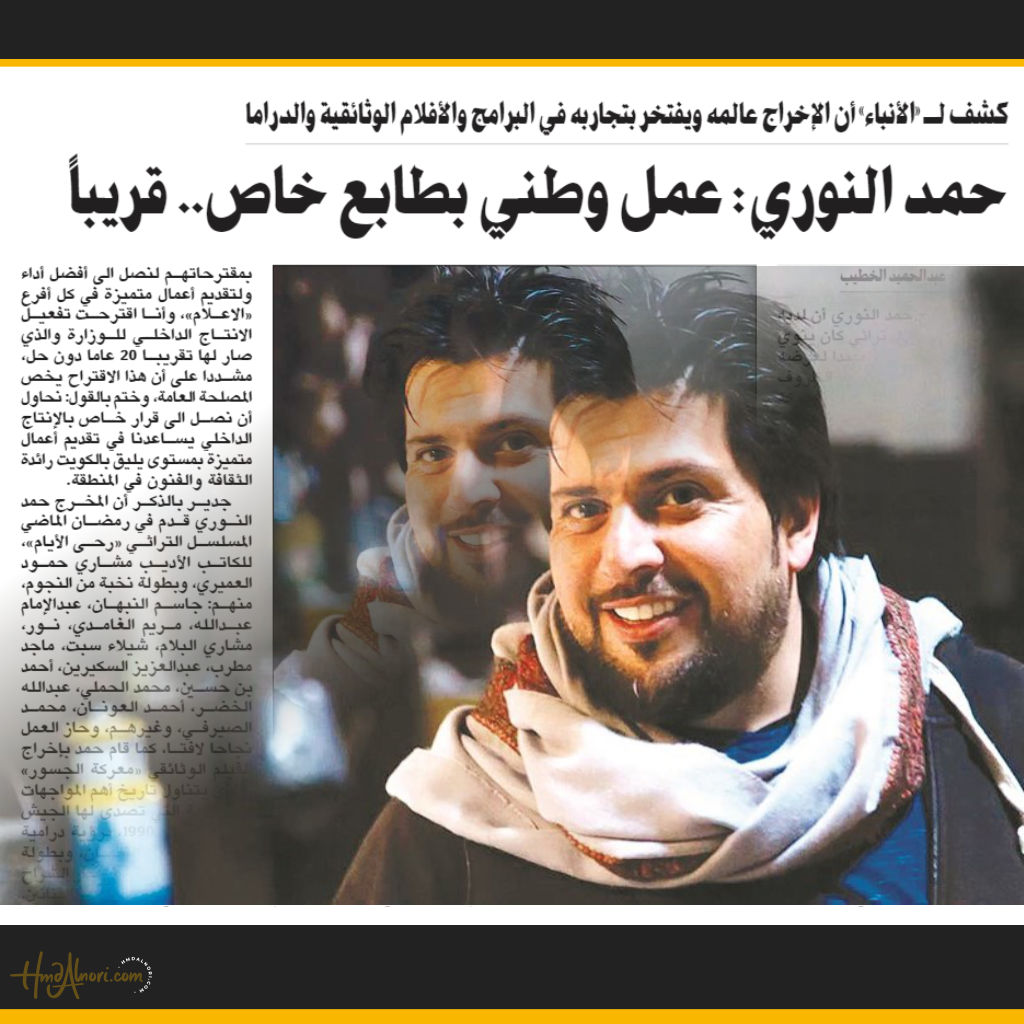
I always affirm my love for traditional works, which fascinate me with their details, which exude the fragrance of our beautiful past.
Director Hamad Al-Nouri confirmed that he had a heritage series project that he intended to implement this period in preparation for its presentation next Ramadan, but due to the current health conditions, the difficulty of travel movement, security and safety measures and precautions against infection, it was postponed to Ramadan 2022, and he said: I always affirm my love for heritage works. Which fascinates me with its details that emit the fragrance of our beautiful past, and our authentic customs and traditions, and in this context I was preparing for a heritage series, but the challenges we are currently facing as a result of the spread of the Corona virus and fear for our fellow artists and “cast” work, will be postponed to next year, God willing.
Hamad continued, in a statement to Al-Anbaa: On the other hand, we have a new, primarily national idea that we seek to implement soon.
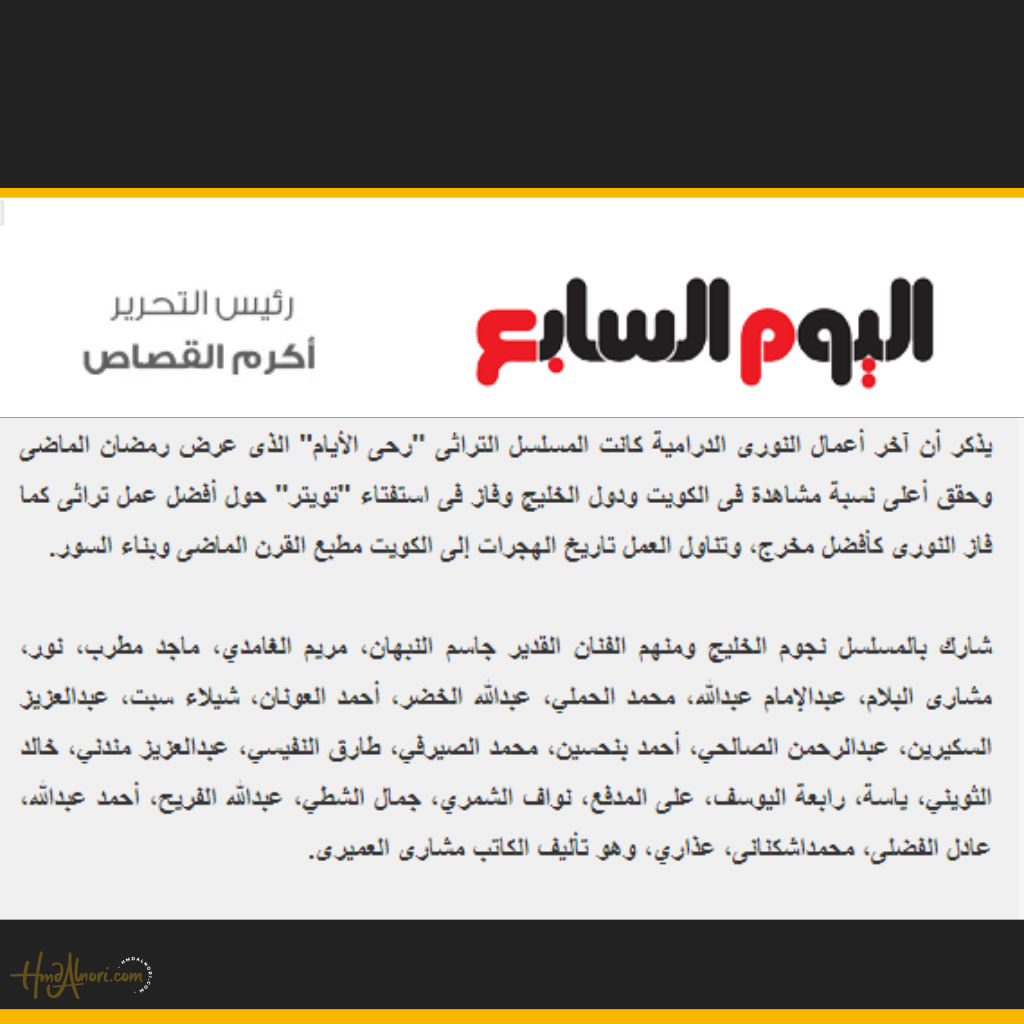
“Raha Al-Ayam” .. the best heritage work, as Al-Nouri won as the best director
It is mentioned that Al-Nouri’s last dramatic work was the heritage series “Raha Al-Ayam”, which was shown last Ramadan and achieved the highest viewership in Kuwait and the Gulf countries and won the “Twitter” referendum on the best heritage work. Al-Nouri also won as the best director, and the work dealt with the history of migrations to Kuwait Printing the last century and building the fence
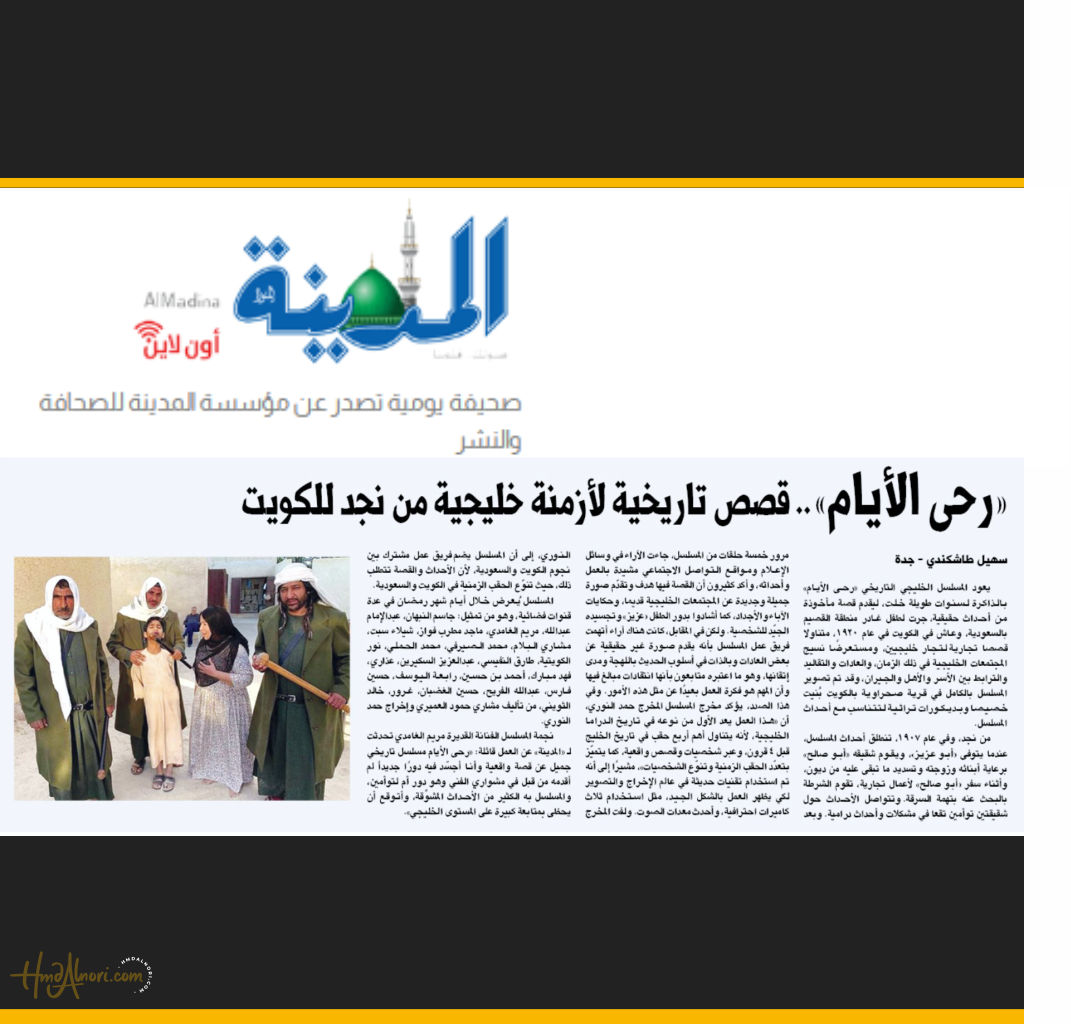
«March of Days» .. Historical stories of Gulf times, from Najd to Kuwait
The historical Gulf series “Raha Al-Ayam” goes back to memory for many years ago, to present a story taken from real events, which happened to a child who left the Qassim region in Saudi Arabia, and lived in Kuwait in 1920, dealing with commercial stories of Gulf merchants, and reviewing the fabric of Gulf societies at that time The series, customs, traditions and interdependence between families, parents and neighbors, was filmed entirely in a desert village in Kuwait that was specially built and with traditional decorations to match the events of the series
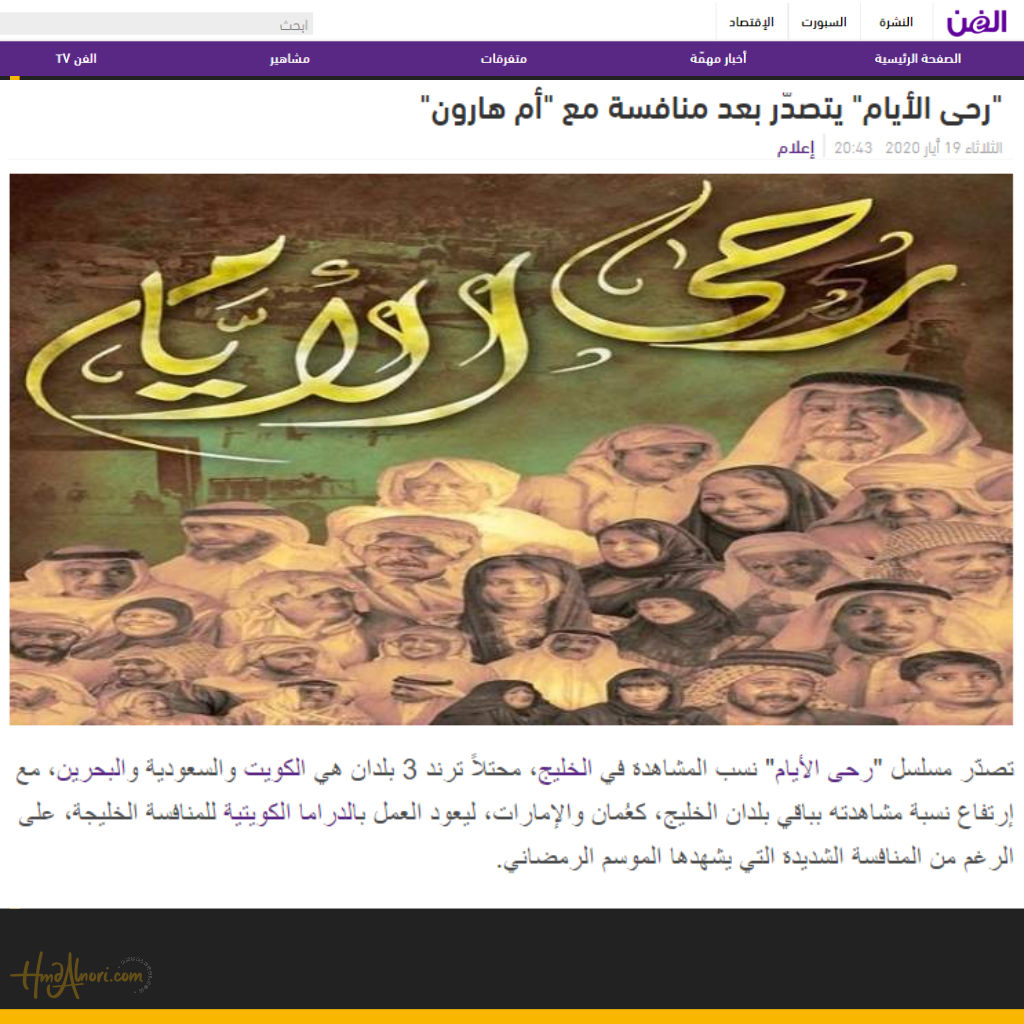
“Raha Al-Ayam” tops the list
The series “Raha Al-Ayam” topped the viewership rates in the Gulf, occupying the trend of 3 countries, namely Kuwait, Saudi Arabia and Bahrain, with a high rate of viewership in the rest of the Gulf countries, such as Oman and the Emirates, to return to work in Kuwaiti drama to the Gulf competition, despite the intense competition that It is witnessed during the Ramadan season.
“Raha Al-Ayyam” fought a strong competition with the series “Umm Haroun”, starring Hayat Al-Fahd, and directed by Muhammad Jamal Al-Adl.
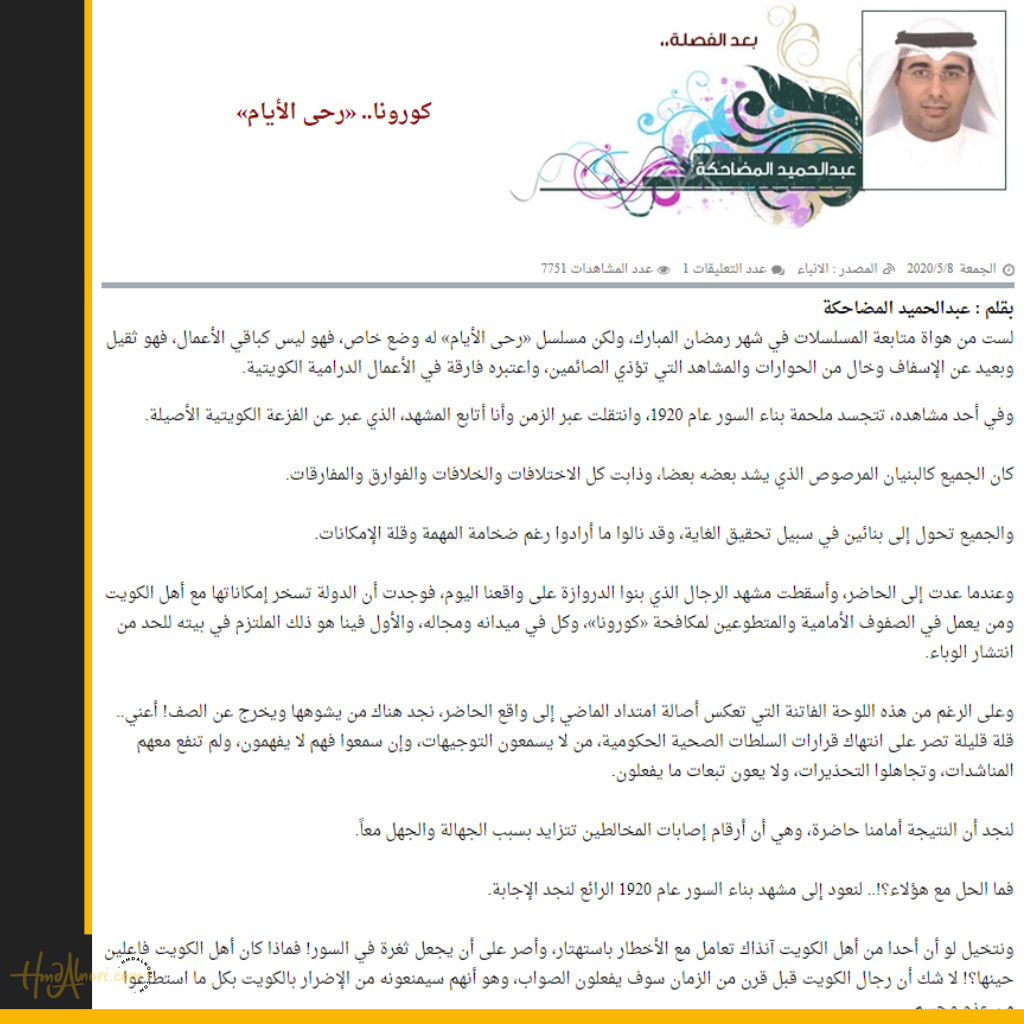
I am not a follower of the series in Ramadan, but “Raha Al-Ayyam” has a special status, not like other works, as it is heavy and far from being ashamed.
I am not a fan of watching series during the blessed month of Ramadan, but the series “Raha Al-Ayam” has a special status, as it is not like other works, as it is heavy, far from demeaning, and free of dialogues and scenes that harm fasting people, and I consider it a milestone in Kuwaiti dramas.
In one of his scenes, the epic of building the wall in 1920 is embodied, and I moved through time as I followed the scene, which expressed the authentic Kuwaiti terror.
Everyone was like a solid structure that strengthened each other, and all differences, disagreements, differences and paradoxes were dissolved.
Everyone turned into masons in order to achieve the goal, and they got what they wanted despite the enormity of the task and the lack of capabilities
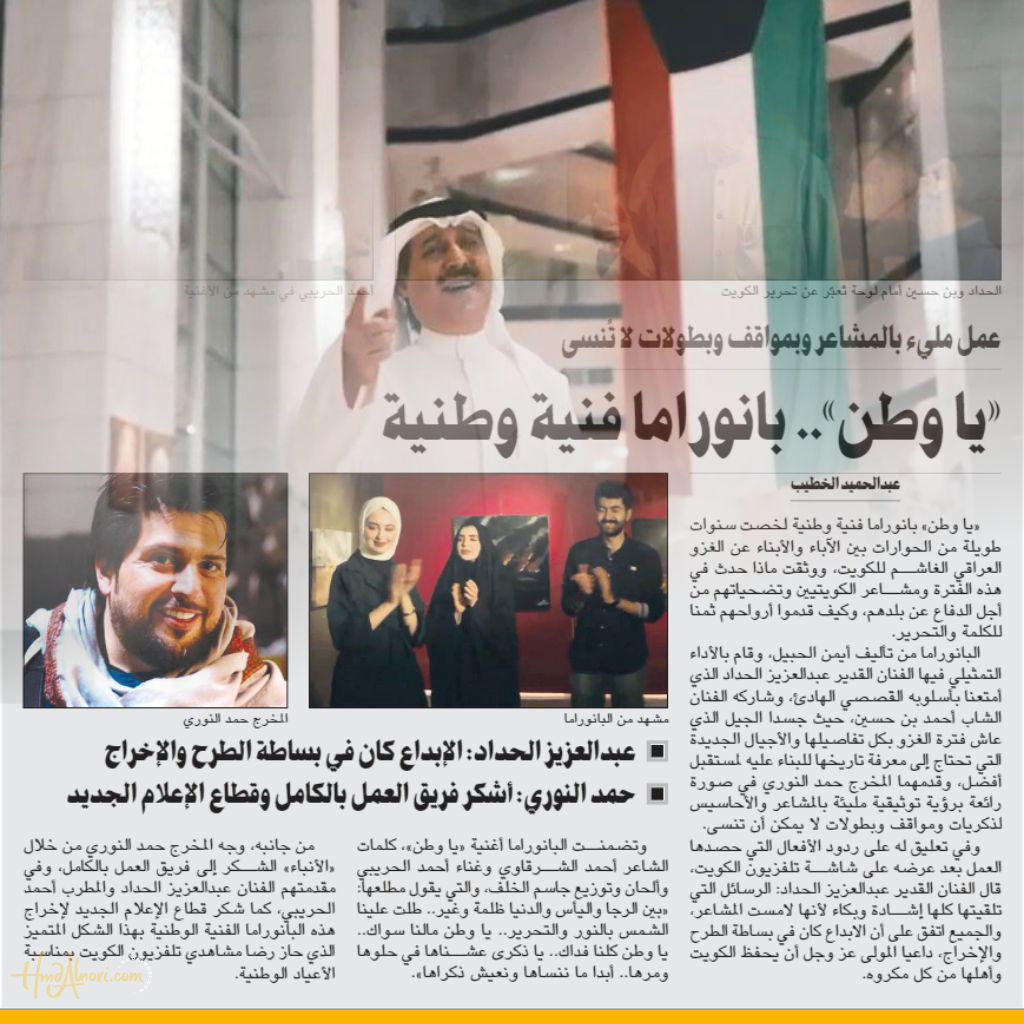
A national artistic panorama summarizing long years of dialogues between fathers and sons about the brutal Iraqi invasion of Kuwait
“Ya Watan” is a national artistic panorama that summarized long years of dialogues between fathers and sons about the brutal Iraqi invasion of Kuwait, and documented what happened during this period, the feelings of Kuwaitis and their sacrifices in order to defend their country, and how they gave their lives as a price for the word and liberation.
The panorama was written by Ayman Al-Habil, and the acting performance was performed by the able artist Abdulaziz Al-Haddad, who entertained us with his calm narrative style, and the young artist Ahmed bin Hussein participated with him, as they embodied the generation that lived the period of the invasion with all its details and the new generations that need to know their history to build on it for a better future, and presented by the director Hamad Al-Nouri in a wonderful picture with a documentary vision full of feelings and feelings of unforgettable memories, situations and heroism.
Commenting on the reactions that the work reaped after it was shown on Kuwait TV, the able artist Abdulaziz Al-Haddad said: The messages I received were all praise and crying because they touched feelings, and everyone agreed that creativity was in the simplicity of offering and directing, calling on the Almighty to preserve Kuwait and her family from all harm.
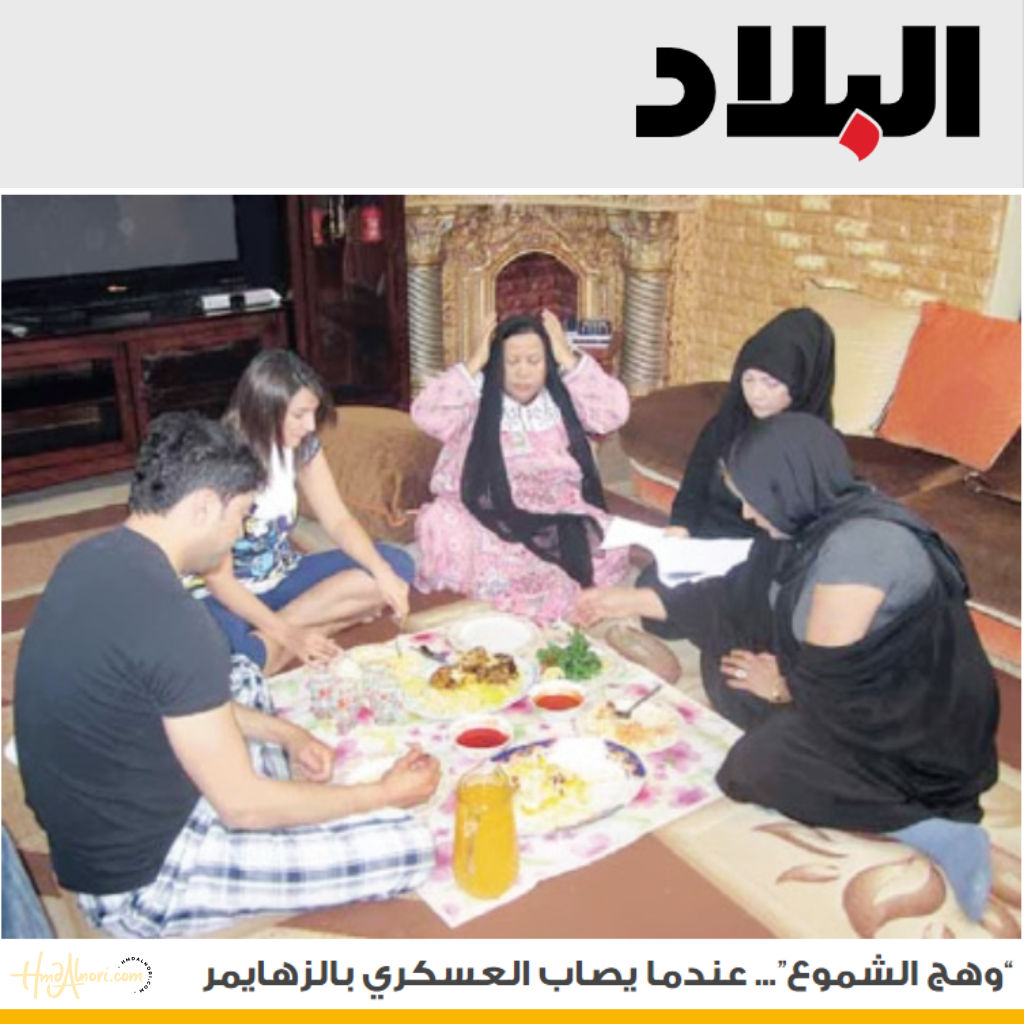
The glow of candles… When the soldier suffers from Alzheimer’s
Al-Musilim pointed out that the series Wajh Al-Shama’ is a tragic social work that includes several dramatic lines, but the main line in it revolves around Alzheimer’s disease, which the hero of the work, Suleiman Al-Yassin, is exposed to, a military commander in the army in the 1973 war. After the attack of the disease, his condition worsens, as he struggles with a slow death, and often loses his mind, because he no longer knows anyone, and the events revolve in a dramatic and interesting mold.
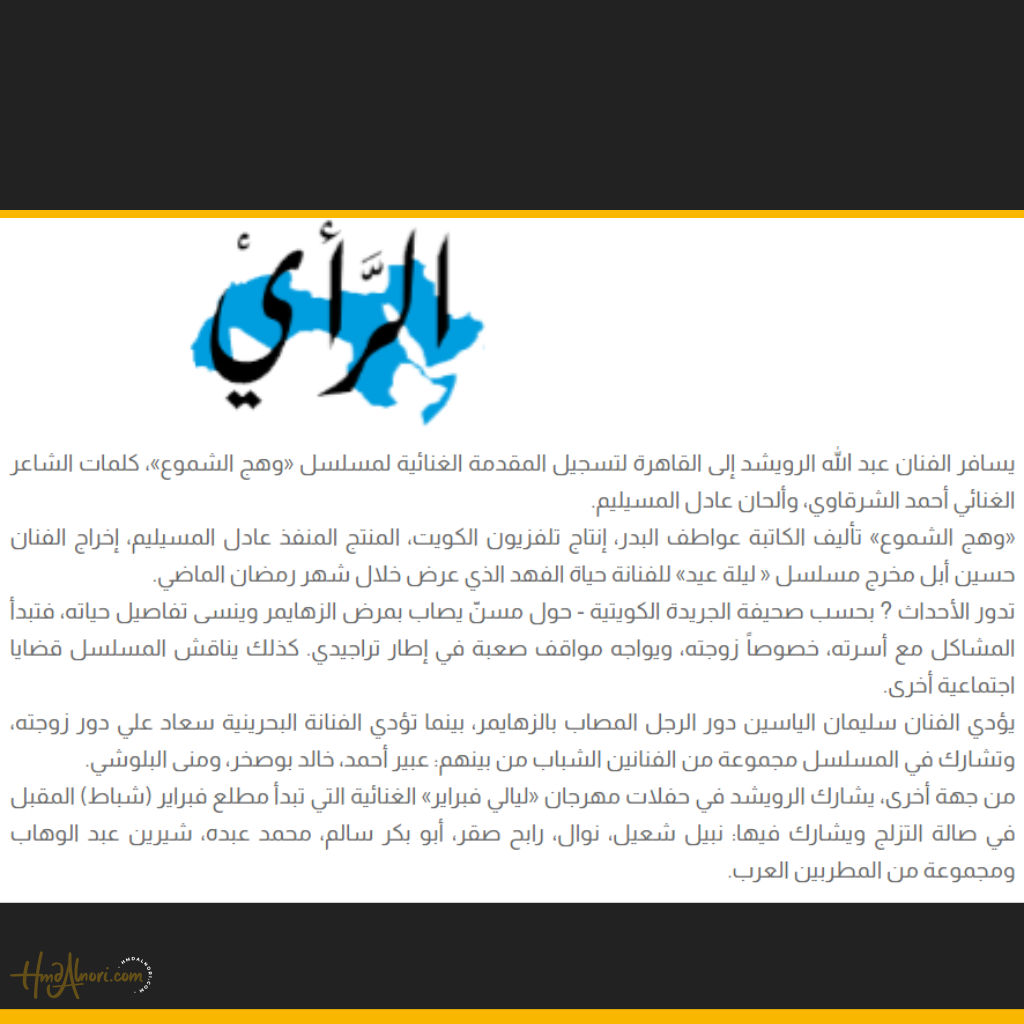
Al-Ruwaished sings the candles’ glow
The artist Abdullah Al-Ruwaished travels to Cairo to record the lyrical introduction to the series “Wahej Al-Shamwa’”, the words of the lyric poet Ahmed Al-Sharqawi, and composed by Adel Al-Musilim.
The events, according to the Kuwaiti newspaper Al-Jarida, revolve around an elderly man who suffers from Alzheimer’s disease and forgets his wife, and faces difficult situations in the context of the details of his life, so problems begin with his family, especially a tragic one. The series also discusses other social issues.
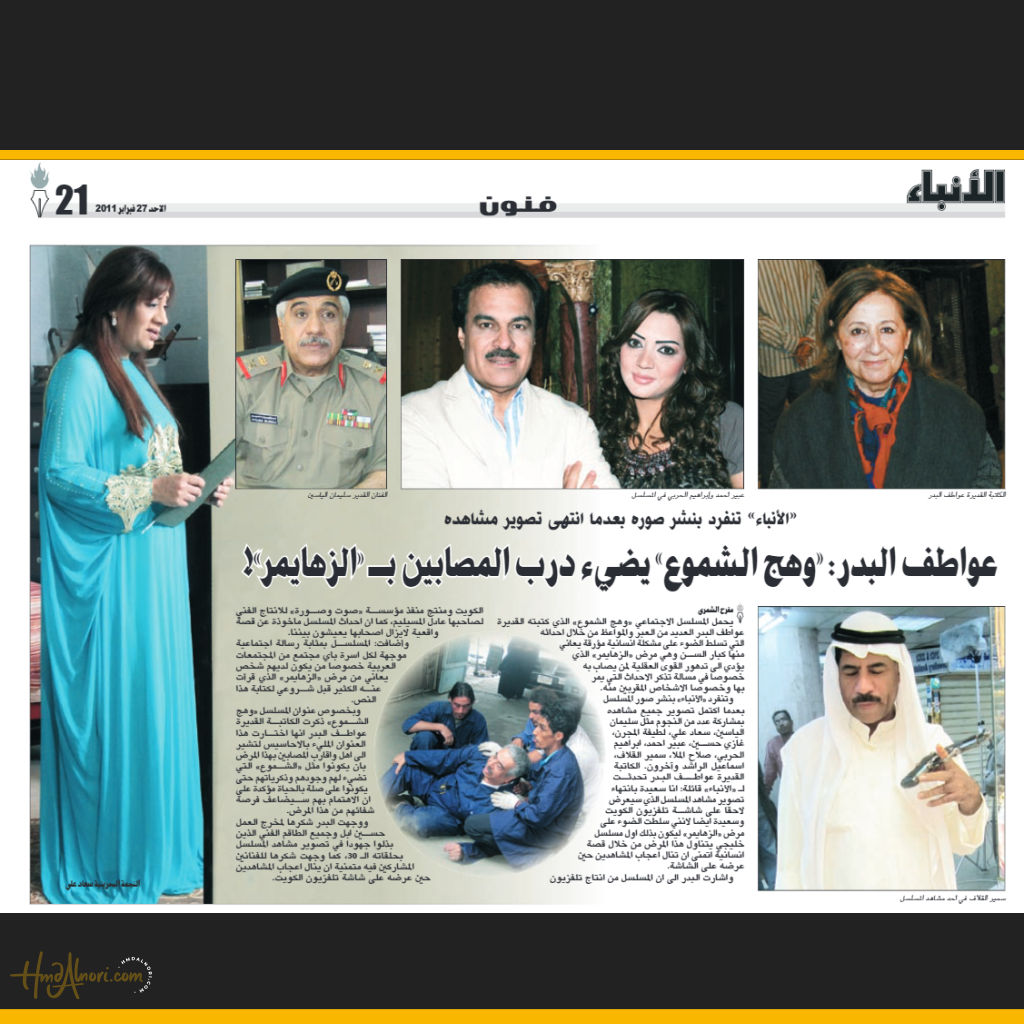
Full Moon: “The glow of candles” lights the path of Alzheimer’s sufferers!
The social series “The Wag of the Candles,” written by the Almighty, Awatef Al-Badr, carried many lessons and sermons through its events that shed light on a troubling human problem that the elderly suffer from, namely Alzheimer’s disease, which leads to the deterioration of the mental powers of those who suffer from it, especially in the issue of the issue of “Alzheimer’s” Remember the events he is going through, especially the people close to him.